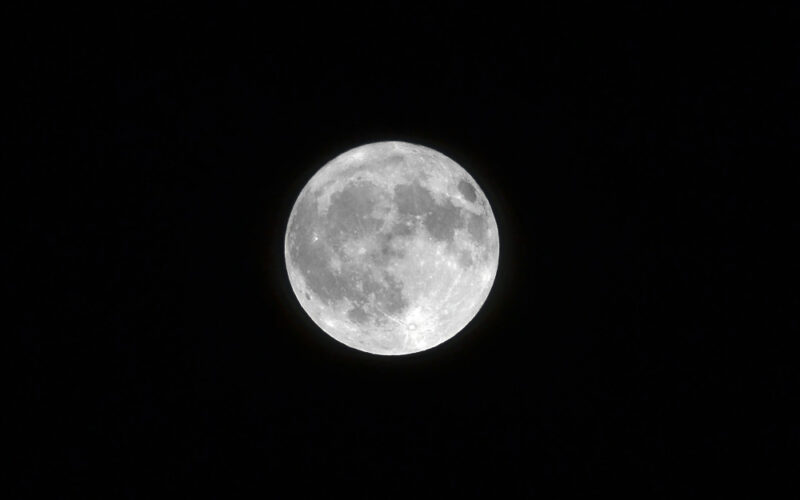Introduction
There is a moon that orbits the Earth, and it is active every day of the year. Many people believe that the moon is unimportant because it only illuminates our surroundings at night, but it has a significant impact on our lives. How does the moon help us live our lives? And how would our lives change if the moon vanished?
Relationship between the month and the moon
The moon is constantly orbiting planets and asteroids, and the shape of the moon changes every day when seen from the earth, and its cycle is about one month. It’s no wonder that our monthly calendar is determined by the cycles of the moon.
The moon starts out as a dark new moon and gradually brightens to become a full moon. After that, the sunlit portion becomes smaller, and then it returns to the new moon. This one cycle takes about one month (29.5 days).
The moon orbits the earth and moves between the earth and the sun to complete a new moon. The illuminated portion of the moon faces away from the Earth during the new moon. The moon orbits the Earth counterclockwise. A full moon occurs when the moon’s orbit moves the earth between the moon and the sun.
The moon constantly orbits the Earth. Not only that, but the moon rotates once every 27.3 days. Because the two cycles are nearly identical, we always see the same side of the moon and never the opposite side (Lunar and Planetary Institute, 2023).
Full moon and physical conditions
McMurray (2021) says that the moon affects and changes our physical conditions.
・Heart
According to an article in the Indian Journal of Basic and Applied Medical Research, the heart performs best during the period between the full moon and the new moon.
・Kidneys
According to the Journal of Urology (2011), pain in the kidneys increases during the full moon. Another British researcher also found that many people complained of urinary symptoms during the full moon. On the contrary, the new moon can calm these people down.
・Menstrual cycles
A woman’s menstrual cycle is said to last 28 days on average. Numerous studies have shown that ovulation and menstruation coincide with the timing of full and new moons. So, women can determine the timing of their menstrual cycle by the phases of the moon.
・Injury
The full moon has a certain influence on our behavior. As a result, people are more susceptible to injury and illness during the full moon, and the number of emergency calls is increasing.
There is also the fact that the phases of the moon affect the birth rate and sleep, but the cause is still under investigation and not clear.
What would our life be like if the moon didn’t exist?
These would be the effects if the moon didn’t exist, according to Puiu (2022).
・Effect on the climate
The gravitational forces between the Earth and the moon have a large effect on tides. Therefore, when the moon disappears, the tide will be about 50–75% lower than it is now. As a result, only the gravitational force of the sun is added, slowing the circulation of matter around the world’s coasts. Crabs, starfish, and snails are highly dependent on tides, so if the moon were gone and the tides were low, they would have a hard time surviving.
Furthermore, tidal movements and climate are closely related, as tidal movements drive ocean currents and distribute warm water around the globe. Therefore, if there is no tide, the temperature will become extreme, and abnormal weather will occur frequently.
・The night gets darker
The moon reflects the sun’s light. Consequently, if the moon were to vanish, the night would be even darker. As a result, many nocturnal animals would struggle to survive and become extinct. Because non-nocturnal animals reproduce based on lunar cues like light intensity, geomagnetism, and gravity, the moon is essential for all living things.
・The seasons would change a lot
There are four seasons on Earth because it rotates on its axis, which is tilted 23.5 degrees. This tilt results in longer days and warmer temperatures in the northern hemisphere during the summer as the earth tilts toward the sun.
In fact, this tilt is maintained by the presence of the moon. So, when the moon is gone, the planet’s axis wobbles, and the seasons go wrong. Even a slight tilt could trigger an ice age.
Conclusion
The phases of the moon have an impact on our lives, but they can also have a negative impact on our bodies. The moon is absolutely necessary on Earth because it regulates the climate and seasons. We should understand the moon’s existence and role and live in a way that acknowledges its significance to us.
References
Lunar and Planetary Institute (2023). Sky Tellers – The Myths, the Magic, and the Mysteries of the Universe. [online] Usra.edu. Available at: <https://www.lpi.usra.edu/education/skytellers/moon-phases/> [Accessed 7 March 2023].
McMurray, C. (2021). 7 Ways The Moon’s Phases May Affect Your Health – Farmers’ Almanac. [online] Farmers’ Almanac. Available at: <https://www.farmersalmanac.com/7-ways-moon-affects-health-26747> [Accessed 7 March 2023].
Puiu, T. (2022). What would happen if the Moon disappeared? [online] www.rmg.co.uk. Available at: <https://www.rmg.co.uk/stories/topics/what-would-happen-if-moon-disappeared#:~:text=It%20is%20the%20pull%20of> [Accessed 7 March 2023].
